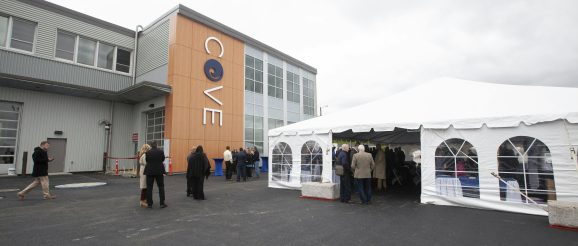Dartmouth’s Cove lands key role with NATO defence innovation hub | SaltWire

The Cove ocean research hub in Dartmouth will play a prominent role in a new defence innovation hub in Halifax for the North Atlantic Treaty Organization. Cove, along with Communitech in Waterloo, Ont., was announced Friday as an “accelerator” that will deliver programming to companies that participate in the Defence Innovation Accelerator for the North Atlantic (DIANA). “Canada is a hub for defence innovation, and Canadian innovators have a great deal to offer our NATO Allies,” Defence Minister Bill Blair said in a news release. “The integration of our domestic experts with NATO’s DIANA will strengthen our capacity to develop cutting-edge solutions to the security challenges faced by Canada and our NATO allies.” DIANA is intended to promote co-operation between NATO’s military members and the technology sector, including startup companies and academic researchers. In addition to the accelerators, 13 test centres across the country were announced, including the Launch lab at the Fisheries and Marine Institute of Memorial University in St. John’s, N.L. DIANA focuses on deep tech and dual-use technologies that have civilian and military uses, according to the government. Proponents say it will help facilitate co-operation between military operators and the alliance’s startups, scientific researchers and technology companies to help NATO maintain a technological edge over threats posed by emerging technologies. DIANA supports companies with training, funding, commercial advice and access to defence expertise and investors. Through competitive challenges, the government says, selected innovators can receive grant funding, acceleration advice and access to the network of accelerators and test centres. It was announced in 2022 that NATO DIANA would be coming to Canada, with its North American regional office in Halifax and the other in London, U.K. The Halifax office will open by the summer at the TD Centre in downtown Halifax, supported by initial funding from Ottawa of $26.6 million over six years. NATO DIANA’s transatlantic network of accelerator sites and test centres are in 28 Allied nations. DIANA issues “challenges” in specific problem areas and asks innovators to bring forward solutions; in its pilot year, those challenges were energy resilience, undersea sensing and surveillance and secure information sharing. Forty-four companies were selected from more than 1,300 applicants to join DIANA’s first accelerator program in 2023; they are participating in a six-month “bootcamp” in partnership with DIANA-affiliated accelerators. Accelerators Cove – Dartmouth Communitech – Waterloo, Ont. Test centres The Launch, Fisheries and Marine Institute of Memorial University – St. John’s, N.L. ACE Climatic Aerodynamic Wind Tunnel and Core Research Facility – Ontario Tech University Canada, Oshawa, Ont. University of Alberta – Edmonton Area X.O. – Ottawa Vaccine and Infectious Disease Organization (VIDO) / University of Saskatchewan – Saskatoon, Sask. Testing Network – Mohawk College, Saskatchewan Polytechnic, 3 Points in Space Media, SubZero North – Saskatoon / Hamilton, Ont. Southern Alberta Institute of Technology (SAIT) – Centre for Innovation and Research in Advanced Manufacturing and Materials (CIRAMM) – Calgary, Alta. Centre technologique en aérospatiale (CTA) – St-Hubert, Qué. Aerospace Research Centre, National Research Council Canada – Ottawa Automotive and Surface Transportation Research Centre, National Research Council Canada – Ottawa / Boucherville, Qué. Digital Technologies Research Centre, National Research Council Canada – Ottawa Ocean, Coastal and River Engineering Research Centre, National Research Council Canada – St. John’s / Ottawa Canadian Photonics Fabrication Centre, National Research Council Canada – Ottawa
